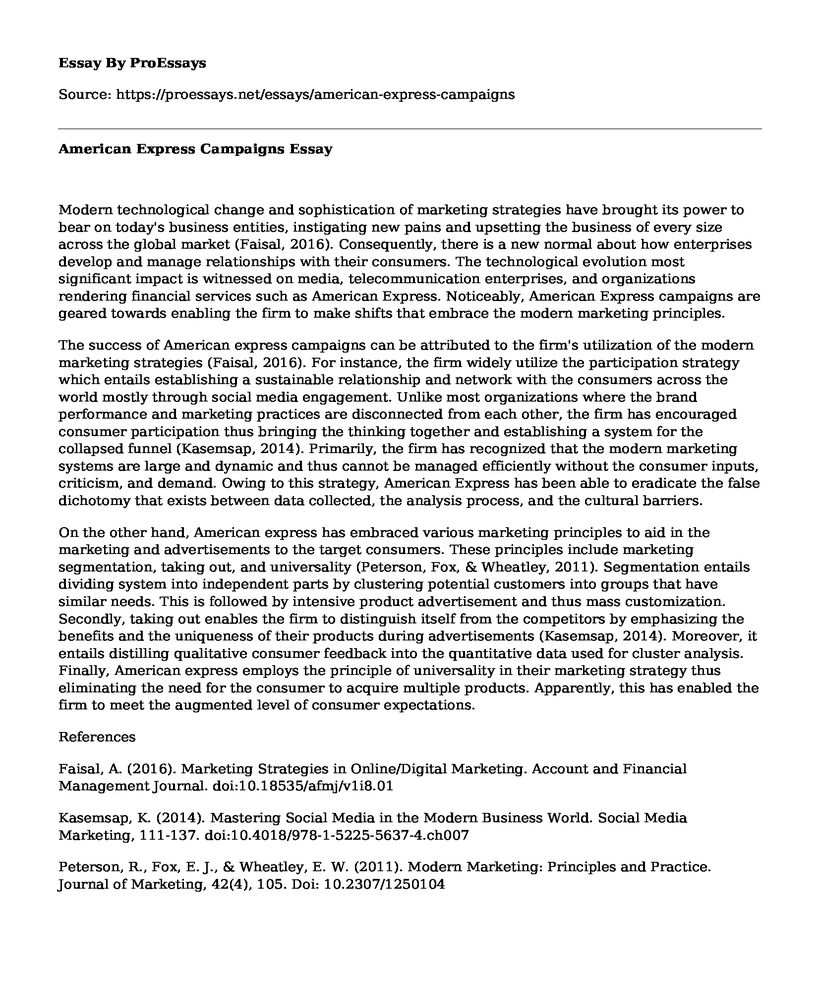Modern technological change and sophistication of marketing strategies have brought its power to bear on today's business entities, instigating new pains and upsetting the business of every size across the global market (Faisal, 2016). Consequently, there is a new normal about how enterprises develop and manage relationships with their consumers. The technological evolution most significant impact is witnessed on media, telecommunication enterprises, and organizations rendering financial services such as American Express. Noticeably, American Express campaigns are geared towards enabling the firm to make shifts that embrace the modern marketing principles.
The success of American express campaigns can be attributed to the firm's utilization of the modern marketing strategies (Faisal, 2016). For instance, the firm widely utilize the participation strategy which entails establishing a sustainable relationship and network with the consumers across the world mostly through social media engagement. Unlike most organizations where the brand performance and marketing practices are disconnected from each other, the firm has encouraged consumer participation thus bringing the thinking together and establishing a system for the collapsed funnel (Kasemsap, 2014). Primarily, the firm has recognized that the modern marketing systems are large and dynamic and thus cannot be managed efficiently without the consumer inputs, criticism, and demand. Owing to this strategy, American Express has been able to eradicate the false dichotomy that exists between data collected, the analysis process, and the cultural barriers.
On the other hand, American express has embraced various marketing principles to aid in the marketing and advertisements to the target consumers. These principles include marketing segmentation, taking out, and universality (Peterson, Fox, & Wheatley, 2011). Segmentation entails dividing system into independent parts by clustering potential customers into groups that have similar needs. This is followed by intensive product advertisement and thus mass customization. Secondly, taking out enables the firm to distinguish itself from the competitors by emphasizing the benefits and the uniqueness of their products during advertisements (Kasemsap, 2014). Moreover, it entails distilling qualitative consumer feedback into the quantitative data used for cluster analysis. Finally, American express employs the principle of universality in their marketing strategy thus eliminating the need for the consumer to acquire multiple products. Apparently, this has enabled the firm to meet the augmented level of consumer expectations.
References
Faisal, A. (2016). Marketing Strategies in Online/Digital Marketing. Account and Financial Management Journal. doi:10.18535/afmj/v1i8.01
Kasemsap, K. (2014). Mastering Social Media in the Modern Business World. Social Media Marketing, 111-137. doi:10.4018/978-1-5225-5637-4.ch007
Peterson, R., Fox, E. J., & Wheatley, E. W. (2011). Modern Marketing: Principles and Practice. Journal of Marketing, 42(4), 105. Doi: 10.2307/1250104
Cite this page
American Express Campaigns. (2022, Apr 20). Retrieved from https://proessays.net/essays/american-express-campaigns
If you are the original author of this essay and no longer wish to have it published on the ProEssays website, please click below to request its removal:
- Hospital Value-Based Purchasing and Single Minute Exchange of Die (SMED)
- Essay Sample on Role of Women in Greek Mythology
- Essay Example on Toni Morrison's Novels: Examining Race & Gender Issues in America
- Fetal Alcohol Syndrome: The Risks of Drinking During Pregnancy - Essay Sample
- Nursing Knowledge Synthesis: From Natural, Social Sciences to Culturally Competent Care - Essay Sample
- Paper Example on My Journey to Become a Nurse: To Serve Society and Make a Healthy Nation
- Essay Example on Professional Nursing: Caring for All







